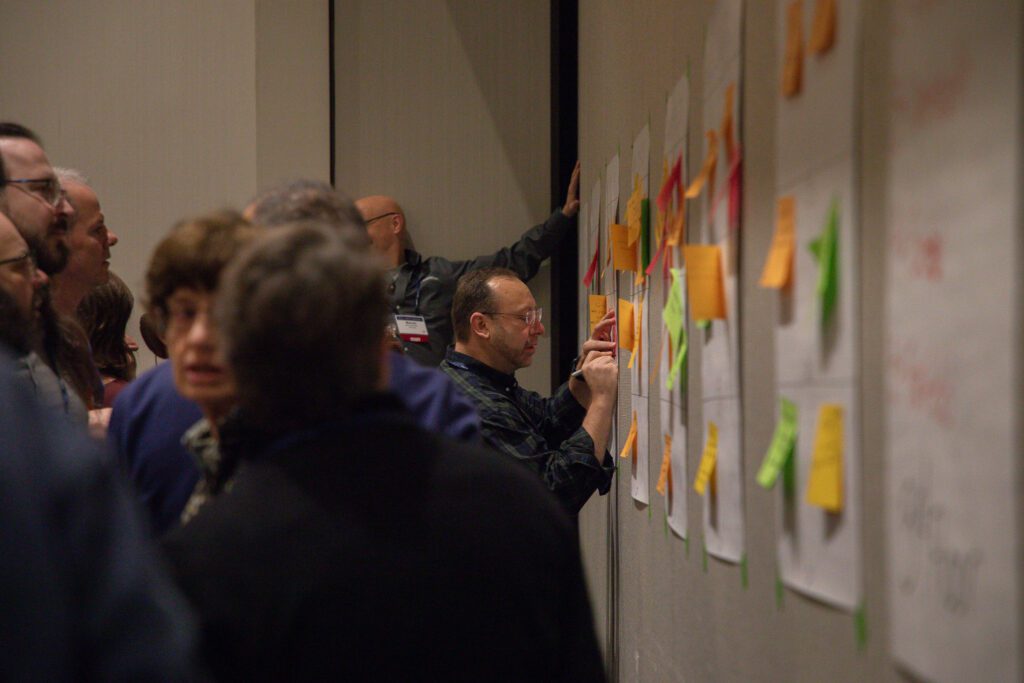Estimated reading time: 4 minutes
By Chris Phillips, Member, Community Architecture Committee for Trust and Identity
For over two decades and counting, I have had the privilege of working in the identity and access management (IAM) field, witnessing and participating firsthand in research and education (R&E) trust and identity (T&I) services and their global impact. Our success was, and continues to be, grounded in our understanding and delivery of standards, technologies, and their application at a global scale. This takes precious time. To do this with quality takes understanding.
For continued success, the challenge is clear: How do we keep our understanding and skills current to both participate in the community and manage our day jobs, all while doing more with a new definition of ”less”?
One core factor behind this is the Iron Triangle interconnectedness of skills, resources (money), and time. A classic trade-off problem that improving one thing often requires sacrificing another. For example, completing a project quickly (time) may require more money or reduced quality. Constantly balancing all three is not only challenging but fatiguing as well. As a result, many of us feel “time‐impoverished” – believing we simply don’t have enough hours to handle everything we need or – want – to do. Over time, this sense of scarcity can fuel stress, burnout, and apathy.
The good news is that there’s a tactic to help reclaim balance and time: applying the micro-habit of investing a little bit in yourself each day. Like compound interest, consistent, incremental progress accumulates. A 1% improvement each day yields a 37x return by year’s end (as popularized by James Clear’s Atomic Habits).
Practically speaking, adding 15 minutes of focus time on what you want per day equals 91 hours in a year—far outstripping the 12 hours you’d get if you only set aside an hour each month. The measurement of success is not to be perfect each day, but to get a bit better each day.

What your 1% daily investment might look like
Even 5 minutes daily reviewing IAM knowledge creates 30hrs/year of focused learning – enough to critically understand 2-3 new protocols.
Start small and track progress. What matters is not what to start on but that you started in the first place. To help bootstrap you, I’ve assembled some starting tactics and places:
- Daily: Take 2 minutes setting up a daily Google trend alert can help you have it in your inbox daily – with specific IAM keywords relevant to your institution’s immediate challenges, not general trends. This ensures you only see what matters to your context.
- Journal your insights to capture knowledge and leave yourself hints on where to go next. Set up a personal wiki or OneNote with sections for things like common error resolutions and configuration snippets you can reference in the future.
- Where to start:
- InCommon Futures2 Report – a community sourced vision of what’s next for R&E IAM.
- IdPro.org Body of Knowledge (BoK) – depth, clarity and industry wide community for IAM.
- Weekly: Consider joining the conversations with your peers where you tackle the same issues. Start with Trust and Identity Working Groups where R&E institutions align on shared challenges and strategies. From there, bring that vision to REFEDS or IETF to shape global standards we all depend on. Small steps—advocating for your institution’s needs or sharing use cases—can drive big change and champions the ethos, “Solve it centrally, solve it for all.”
- Monthly: Participate in monthly discussions through IAM Online and adhoc community roundtables hosted by InCommon Academy. Hear what’s next on emerging trends and innovative approaches shaping the future of IAM in R&E. To learn more about getting involved and make your voice heard.
To change habits takes time and here, momentum is better than perfection. Missing a day matters less than keeping consistent with the process. The collaborative space of Internet2 is a rich one due to community participation and can amplify your voice and your actions. Each small step adds up. You never know; the next 15 minutes could shape the next 15 years.
